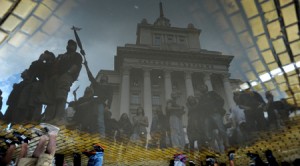Join Mariya Ivancheva for a talk and discussion in the seminar room at the Center for Place, Culture and Politics.
November 20, 6:00-7:30. Room 6107, Graduate Center, CUNY
In the last decades of the Cold War, scholars and activists hailed Eastern European civil society for its mobilization despite the structural constraints to internal critique under state socialism. Yet by the early 2000s the overall enthusiasm gave way to weary accounts of the NGO-ization of a donor-driven civic activism. A decade later many Eastern European countries joined what seemed a broader wave of social protests. Yet, interpreting the Eastern European protests as part of the protest wave against indebtedness, austerity, and precariousness might be misleading. Focusing on the Bulgarian protests from 2012-2013 I indicate how a number of mutually reinforcing protest frames made the framing of coherent economic and political demands increasingly difficult. They draw a possible demarcation line within the emergent global protest wave that needs to be explored as an expression of long-term economic and political processes, underway already before 1989.
Mariya Ivancheva is a junior visiting fellow at the Institute of Human Sciences in Vienna (IWM). She recently earned a PhD in Sociology and Social Anthropology from the Central European University in Budapest, on the topic of the higher education reform in Bolivarian Venezuela. She is a member of the Social Centre Xaspel collective in Sofia, Bulgaria, and an editor of the eastern European leftwing web portal Lefteast (http://www.criticatac.ro/lefteast/).




RT @PCPatGC: Discussion today: Bulgarian protests of 2012/13, part of a global protest wave? 6-7pm CUNY GC rm 6107. http://t.co/GFBw6Q9UE3
RT @PCPatGC: Discussion today: Bulgarian protests of 2012/13, part of a global protest wave? 6-7pm CUNY GC rm 6107. http://t.co/GFBw6Q9UE3
Discussion today: Bulgarian protests of 2012/13, part of a global protest wave? 6-7pm CUNY GC rm 6107. http://t.co/GFBw6Q9UE3
Maria João liked this on Facebook.